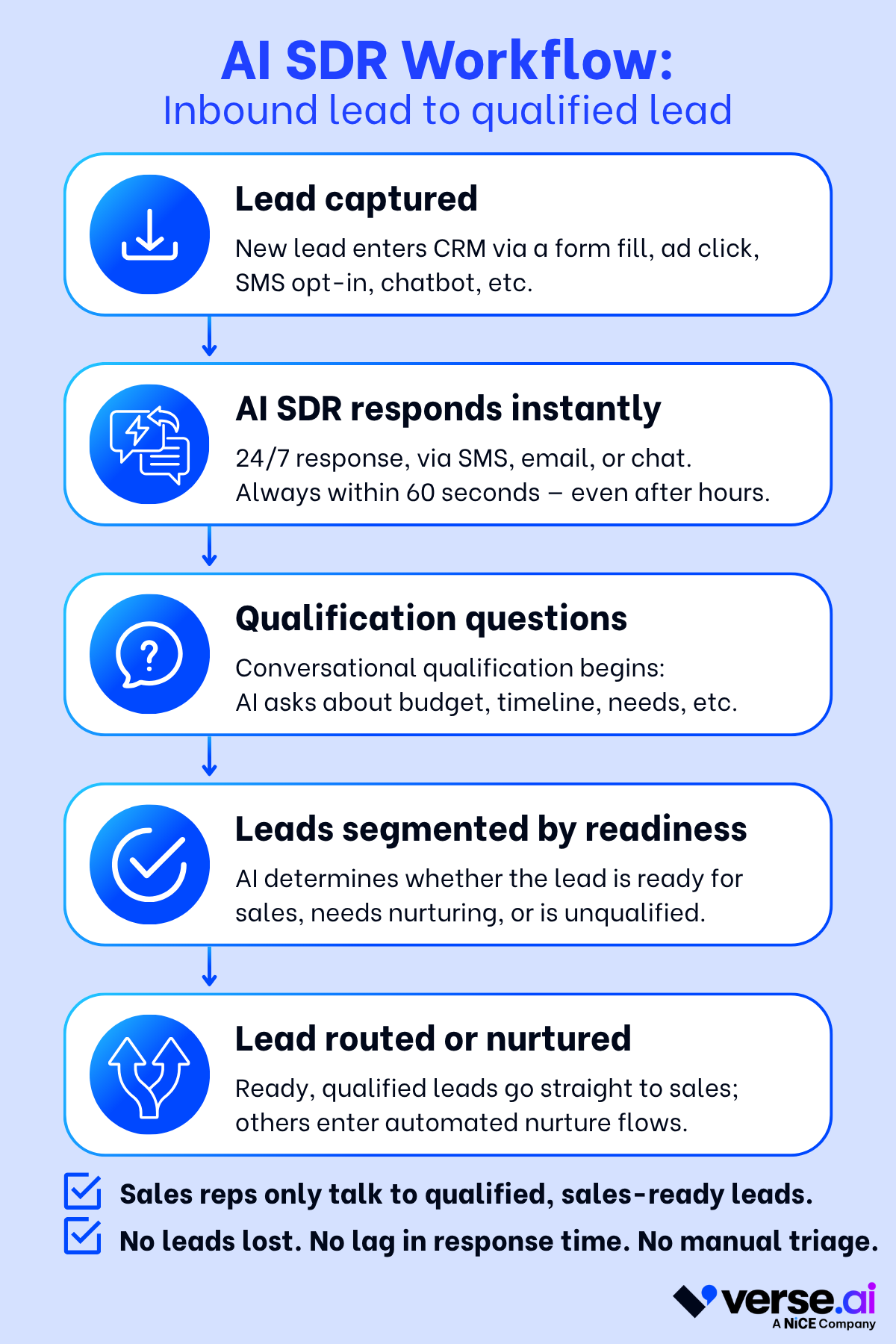SDRs are essential for outbound prospecting, lead qualification, and pipeline development — but they can be difficult to scale, and are often overworked.
Enter the AI SDR: AI designed to automate the early stages of the sales process.
AI SDRs can work alongside your sales team to streamline the sales process: automating certain tasks, ensuring lead engagement during off-hours, reducing burnout, and filtering through unqualified leads.
This post explains what AI SDRs are, what they do, and why they might be your solution for more efficient lead engagement.
What is an AI SDR?
An AI SDR (artificial intelligence sales development representative) is a type of AI agent that automates certain activities that a sales development representative (SDR) would normally do, including lead engagement, qualification, and routing. AI SDRs live at the top of the funnel, allowing human teams to focus on qualified opportunities.
Usually, AI SDRs engage leads via SMS, chat, or email and qualify them automatically.
Though it can use rules and scripts, AI SDR is not the same thing as a chatbot or simple rule-based automation.
Unlike rule-based chatbots, AI SDRs are goal-oriented and conversation-aware.
Acting as an agent, they operate autonomously within specific parameters, and leverage natural language processing (NLP) and natural language understanding (NLU) to both understand and respond to leads.
What does an AI SDR actually do?
AI SDRs are built to handle one of the most painful — and valuable — parts of the sales funnel: early-stage lead engagement and qualification.
AI SDRs are best-suited to do the basic, time-consuming tasks that are often the cause of burnout among human reps. Like human SDRs, these AI agents can follow up with cold leads, qualify them, book appointments, and update the CRM.
An AI SDR can:
- Respond to new leads instantly: Five minutes is the gold standard for lead response time, but this can be difficult or impossible for sales teams to meet every time. With AI, quicker response times are a reality for every lead.
- Conduct two-way conversations independently: Advanced AI allows AI SDRs to talk with leads in a human-like way, without intervention from your team.
- Ask qualifying questions (budget, timeline, etc.): Salespeople hate wasting time on un
qualified leads—when AI does it for you, your sales team has all the information they need right away. - Route hot leads to human reps: AI SDRs can then route qualified, ready leads to the right rep so they can handle next steps.
- Nurture cold leads automatically: For leads who aren’t ready to buy, AI SDRs can automate follow-up and nurture to ensure these leads aren’t simply forgotten.
- Update the CRM: Though some salespeople aren’t
consistent about CRM updates, AI is; this ensures that every interaction the AI has is tracked, and customer data is accurately updated. - Operate 24/7 without burnout: For human reps, it’s unfeasible to respond 24/7—even though that’s what consumers want. With an AI SDR, your team can reap the benefits of 24/7 instant response, without any burnout.
Constant rejection, weeding through unqualified leads, and scrolling the CRM can cause burnout and even turnover among human teams—but not for AI.

Do AI SDRs replace human reps?
AI SDRs automate tasks at the very top of the funnel—they don’t actually sell. At this time, AI SDRs are more useful for inbound activities rather than outbound, so human SDRs can shift their focus more towards outbound.
So in short, no, AI SDRs do not replace human reps. For some companies, they can reduce hiring needs.
AI SDRs replace time spent on repetitive, top-of-funnel tasks, freeing up humans to spend more time on quality lead engagement and conversion.
Humans own the actual selling motion. In addition, human reps are critical for:
- Complex objections or questions
- Relationship building
- Enterprise or nuanced deals
- Phone calls
AI acts as your first response to inbound leads—not your whole team.
Benefits of using an AI SDR
An AI SDR can provide measurable ROI in many ways. From improving speed-to-lead and ensuring that every lead is spoken to, AI SDRs boost sales efficiency.
- Your team follows up faster: Speed-to-lead can be a huge differentiator. Research shows that 78% of consumers will choose the company that contacts them first—AI SDRs increase your chances of being first to respond.
- No more missed leads during off-hours: With 24/7 coverage, your team will no longer miss any leads overnight or during weekends.
- Sales has a more qualified pipeline: With AI qualifying leads automatically, reps only talk to ready, qualified leads.
- Your team can scale strategically: No matter your lead volume, AI allows for infinite scale—there is no need to hire more SDRs just to keep up.
- Messaging and process is quality-controlled: Every single inbound lead is not only engaged, but handled the same exact way, every time.
- Your CFO is happy: While providing all these benefits, AI SDRs are also the most cost-effective solution to scale sales outreach.
Use cases for AI SDRs
Across industries, there are a variety of use cases for AI SDRs to save time, scale outreach, and improve conversion.
AI SDRs for high-volume B2C
In competitive B2C industries where speed-to-lead is everything, AI SDRs work alongside sales teams to automatically follow up with every new lead in seconds, 24/7. From there, only high-intent, qualified leads are routed to human agents.
For example: A mortgage company can use an AI SDR to respond to new online leads in under 60 seconds, qualify them by interest and credit score criteria, and hand off only pre-approved, ready-to-talk prospects to loan officers.
AI SDRs for small teams
AI SDRs help small teams scale without the high cost of hiring more reps. With AI handling qualification and triage, human reps can focus on sales-ready conversations.
AI also enables small teams to keep up with high volumes. If there is a busy season, AI can do the extra work rather than letting any opportunities slip by.
For example: A three-person pool repair and maintenance company uses an AI SDR to qualify and pre-book estimate appointments. During the summer, when requests skyrocket, AI SDRs effortlessly handle all the extra leads without falling behind or hiring more people.
AI SDRs for BPO replacement or augmentation
At the enterprise level, hiring outsourced SDRs or using a BPO can be costly, hard to scale, and inconsistent. AI SDRs, on the other hand, are consistent, compliant, and instant.
They can also be combined with human reps for a hybrid model.
For example: An insurance company replaces its overnight ISA team with an AI SDR that qualifies and routes leads automatically by morning — saving thousands per month.
How AI SDRs help marketing and revenue teams
AI SDRs don’t just help sales—they make your entire funnel more efficient, which benefits marketing and revenue teams.
With instant response, AI SDRs can:
- Improve conversion rates from MQL to SQL
- Ensure fast follow-up from lead forms and ad campaigns
- Add intent data and qualification notes to your CRM
- Align with lead scoring models
For example: A RevOps leader integrates an AI SDR into their lead scoring flow — any lead that hits an 80+ score gets contacted and qualified instantly, increasing conversion rate by 20%.
How to implement an AI SDR
Implementing an AI SDR doesn’t require technical expertise or building your own tool from scratch (especially when you’re using a fully-managed platform like Verse!).
An AI SDR is not meant to replace your sales team members, but help them with specific tasks like lead qualification, lead nurture, routing, and appointment setting.
When it comes to implementing an AI SDR, here are a few best practices you’ll need to follow:
- Customize conversation flows
Verse uses customizable scripts designed to match your brand voice, product offering, and common lead questions. These scripts guide how the AI engages with leads. You will dictate how the AI talks to leads and what questions it can answer, while Verse helps optimize for conversion and SMS.
- Define lead qualification criteria
You will set and adjust qualification rules based on what matters most to your business. Verse can qualify based on custom criteria such as geographic location, loan amount, service interest, or readiness to buy, ensuring only qualified leads are passed to your sales team.
- Use human-in-the-loop
While AI SDRs can handle 24/7 lead engagement automatically, it should not be left without human-in-the-loop. Verse includes our team of human concierges who step in when the AI encounters a question it can’t confidently handle, or simply a conversation that requires human insight or empathy. Human-in-the-loop is a must for quality assurance, accuracy, and empathy in your AI SDR’s conversations.
- Integrate with your tech stack
Any AI SDR you choose should connect with your CRM and lead distribution platform. This way, the AI can automatically conduct CRM updates and route qualified leads to the right rep or workflow. With Verse, you get real-time notifications, detailed conversation logs, and lead insights.
- Constant monitoring and testing
An AI SDR also requires constant monitoring for quality. Depending on what AI SDR platform you use, you may need to do this yourself. With Verse, this is all handled by our expert team.
Example of an AI SDR
There are many examples of AI SDRs that you can choose from, with varying levels of autonomy, human oversight, compliance rules, and channel capabilities.
Verse is an example of an AI SDR that is built to operate with little to no effort from your end, but still optimizes conversations for quality, compliance, and SMS communication.
- Autonomy matters because while you want the AI SDR to function with little effort from your end, it’s important that the AI understands what it can and cannot do or say. Verse AI, for example, has guardrails in place to ensure it does not give inaccurate information.
- Human oversight is an important factor, because humans are often necessary for sensitive or complex questions. For example, Verse includes our team of human concierges that are always overseeing AI’s conversations. With other platforms, your team may need to stay in the loop.
- Compliance must be built into the AI SDR — you don’t want the AI to say or do anything that violates compliance guidelines. Verse includes compliance guidance and builds compliance into our scripts.
- Channels that AI SDRs can use often include email, chat, or SMS. Verse uses SMS, because it is consumers’ highest-preferred channel. With SMS, compliance is vital.
Learn more about Verse’s AI SDR by checking out our self-serve demos or booking a call today.
AI SDR: FAQ
Does an AI SDR replace human SDRs?
Not entirely. AI SDRs are designed to complement human SDRs by handling repetitive, early-stage tasks like lead follow-up and qualification. This allows your human team to focus on qualified leads and close deals.
How does an AI SDR qualify leads?
An AI SDR qualifies leads by asking predefined questions through SMS, chat, or email (e.g., budget, timeline, location). It evaluates responses in real-time to determine if the lead meets your sales criteria—then routes or nurtures accordingly.
Is using an AI SDR better than outsourcing to a call center or BPO?
In many cases, yes. AI SDRs respond instantly, operate 24/7, and reduce human error and compliance risk. They’re also more scalable and cost-effective than outsourcing SDR roles.
Can I integrate an AI SDR with my CRM or marketing automation platform?
Most AI SDR platforms (like Verse) are built to integrate seamlessly with CRMs like Salesforce or HubSpot, and with marketing tools.
How much does an AI SDR cost?
The cost of an AI SDR depends on the platform and features offered. Most solutions are priced on a monthly subscription or usage basis.
Some AI SDR platforms charge per lead engagement, per qualified lead, or offer volume-based tiers. Compared to hiring or outsourcing SDRs, AI SDRs are typically more cost-effective, especially for high lead volumes, since they scale without needing additional headcount.


